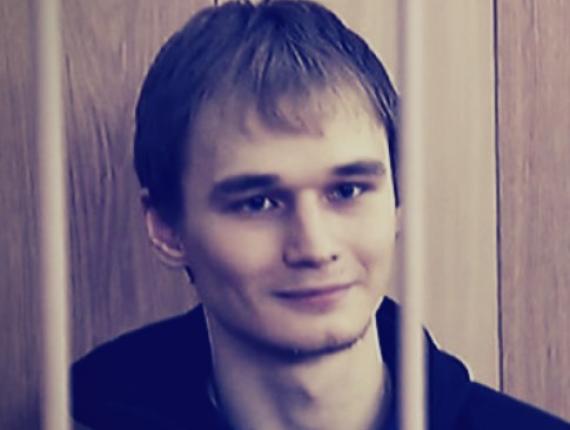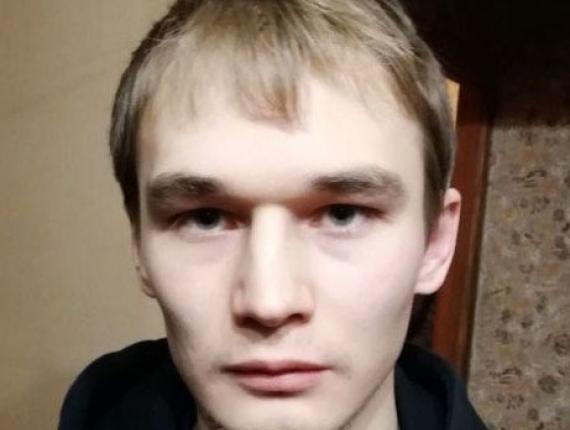Mathematician and anarchist Azat Miftakhov is a political prisoner, Memorial says
The persecution of Azat Miftakhov is a prime example of the use of pseudo-legal procedures to suppress public activities that are undesirable for the authorities.
Azat Miftakhov, a graduate student in the engineering mathematics faculty at Moscow State University and a supporter of anarchist views, is under investigation on two counts. He has been charged with an offence under Article 213, Section 2, of the Russian Criminal Code (‘Hooliganism by a group of persons by prior agreement,’ for which the penalty is up to seven years’ deprivation of liberty) and is suspected of an offence under Article 223.1, Section 1 (‘Illegal preparation of explosive substances and explosive devices,’ for which the penalty is up to six years’ deprivation of liberty).
In the first instance, Miftakhov he has been charged with allegedly taking part in an attack on 31 January 2018 on an office belonging to the United Russia party, and in the second instance is suspected of making an improvised explosive device that was discovered on 11 January 2018 in the town of Balashikha outside Moscow. With respect to the first, the criminal investigation under Article 213, Section 2, of the Russian Criminal Code, a court remanded Azat Miftakhov in custody on 12 February 2019. However, in actual fact he has been deprived of liberty since 1 February 2019.
Memorial Human Rights Centre considers that the prosecution of Azat Miftakhov is an unequivocal example of the use of pseudo-legal procedures to close down civil society activity unwelcome to the authorities. We do not have full information about the civic and political activity of Miftakhov, or about whether he actually took part in People’s Self-Defence, a libertarian civil and political movement, or in the ‘anti-raider’ movement against the illegal seizure of apartments. Nonetheless, the circumstances of the case allow us to state with certainty that the only reason he is being prosecuted is that law enforcement agents are convinced of his links with these types of activity.
Miftakhov and other defendants in the explosives case in Balashikha were subjected to torture. At the very time Miftakhov was tortured, his lawyer Svetlana Sidorkina was seeking admittance to the Balashikha police station where those arrested were illegally being held. Miftakhov asserts he was tortured with an electric screwdriver (the Public Oversight Commission and his defence lawyers recorded corresponding marks on his body). He was threatened that he would be subjected to sexual violence using this instrument. The fact of torture was also confirmed by Ilya Gubsky and Daniil Galkin, also detained on 1 February 2019, who have spoken about it to Mediazona.
However, the use of torture did not help the law enforcement agents to plausibly fabricate the criminal case. Miftakhov was twice detained in connection with these unrelated criminal cases. The arguments put forward by the investigators that Miftakhov is complicit in the offences with which he has been accused were so lacking in substance that he was remanded in custody only on the third attempt, something that is virtually unheard of.
At the same time, the political motivation for the prosecution of Miftakhov and other anarchists is evident. While the continuing repressive measures against anarchists and anti-fascists sharply increased in 2017–2018, the prosecution of Miftakhov simultaneously on two charges is a clear attempt to further weaken the anarchist movement as a whole and People’s Self-Defence in particular. Government agencies, and primarily the FSB, cultivate an image of anarchists as a public danger, people who are involved in terrorism and attempts to destabilise society and politics. The detained anarchists were routinely tortured, with little effort to conceal this fact.
At the same time we see the crushing of all non-systemic, informal self-organisation, especially, although not only, of young people. There have been numerous prosecutions on trumped up charges of groups of people whom the law enforcement agencies dislike and who have other views.
People’s Self-Defence activists assume that the arrest of Azat Miftakhov was part of an attempt by law enforcement authorities to fabricate a major case against people who in one way or another are linked to the organisation, a case that would be presented to the public as prosecution for the creation of an extremist group, similar to the cases of Network and New Greatness. Prior to his detention in July 2018, Miftakhov had already been the subject of threats on anonymous Telegram-channels linked to law enforcement agencies. In some accounts, the prosecution of Azat Miftakhov is related to the desire by law enforcement agents to end the anarchists’ attempts to combat the theft of property by ‘raiders.’ Media reported that ‘on 2 February 2019 the public page of People’s Self-Defence published a new post in which the detention of the anarchists was directly linked to its struggle against apartment raiders.’
Memorial Human Rights Centre considers Azat Miftakhov a political prisoner. We demand his immediate release and an end to the fabricated criminal cases against him.
We also demand that those law enforcement officers involved in this fabrication be brought to justice, including those responsible for torturing the detainees while on remand.
Recognition of an individual as a political prisoner, or of a prosecution as politically motivated, does not imply that Memorial Human Rights Centre shares or approves the individual’s views, statements or actions.
You can read more about this case on our website.
Donations to support Azat Miftakhov’s legal defence can be made as follows:
-
PayPal: freeazat@riseup.net
-
Bitcoin: 18QSya6vR9d1mvwzAteJ5otPVr6NEiTT4g
Donations to the Foundation for Assistance to Political Prisoners of the Union of Solidarity with Political Prisoners for assistance to all political prisoners can be made via PayPal — an e-wallet for giving help to all Russian political prisoners helppoliticalprisoners@gmail.com



